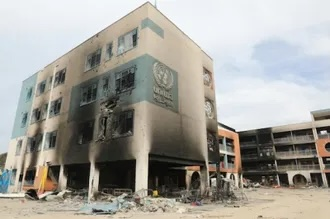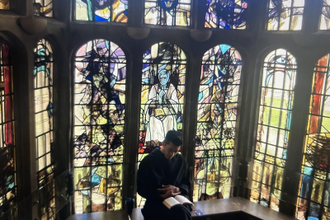Ian Linden: The Pope and Gaza: Reply to Conference of European Orthodox Rabbis

One of UNRWA's destroyed centres. Photo by khalid kwaik on Unsplash
In a newly published book, Hope Never Disappoints, Pope Francis called for an investigation into whether Israel's actions in Gaza fit the legal definition of genocide. On 19 November, an important part of Europe's Jewish leadership responded. (See: www.indcatholicnews.com/news/51190 )
The Conference of European Rabbis Standing Committee represents an alliance of some 700 Orthodox Jewish leaders in Europe. Their statement was distributed by a Public Relations Company, ROATH. We should have some sympathy for the Rabbis being "deeply disturbed", their phrase, by Francis' words. Their language was significantly more measured than Prime Minister Netanyahu's "disgraceful".
In such a passionate, polarised debate there is urgent need for shared understanding of basic facts. What the Rabbis say deserves consideration and a reply. In what follows all words inside quotation marks are from their short text, nothing I hope considered out of context. I have tried to take their points in order of importance.
"Israel is committed to international humanitarian law". This is the key issue considered by the UN's International Court of Justice (ICJ) and International Criminal Court (ICC). Both focus on the cutting off of Gaza's civilian population, intentionally and knowingly, from adequate food, water, electricity and medical supplies. This, rather than the estimated 44,000 Palestinian casualties of war, is the nub of the ICJ indictment of the Israeli Defence Forces (IDF), and of the recent arrest warrants issued by the ICC for Prime Minister Benjamin Netanyahu, and former Defence Minister, Yoav Gallant.
Describing Israel's actions as "defensive war", after a brutal and criminal attack by Hamas waged against an "unprovoked, barbarous enemy", does not ensure legality in international law. Evidence from the UN Independent International Commission of Inquiry on the Occupied Palestinian Territory, describing near-siege conditions and estimating that 70% of Gazan casualties are women and children, does not support the view that Israel is observing international humanitarian law. The ICJ's opinion is that Israel, charged with war crimes and crimes against humanity of the most serious nature, with possibly genocidal intent, has a case to answer. Let's be clear. The ICJ also accused Hamas of committing war crimes and crimes against humanity. An arrest warrant for Hamas military leader, Mohammad Deif (probably dead) was also issued.
Nothing can justify 1,200 Israelis killed including hundreds of women, scores of children, and many wounded. But were the atrocities of 7 October "unprovoked"? Many would argue that Israeli governments' longstanding denial of self-determination for Palestinians, their occupation of East Jerusalem and the West Bank, and encouragement of settlers, and the shooting dead of children throwing stones at the IDF, all call in question the Rabbis' assertion Hamas was "unprovoked".
Hamas, the statement claims, is "a terrorist army that purposefully operates from within civilian population centres", a slightly less incendiary version of the Israeli Government's accusation that Hamas is using the civilian population as human shields. No independent observers or unembedded journalists are allowed into Gaza so there is simply no way of verifying or disproving such allegations. But Gaza is one of the most densely populated areas in the world. The land area on the eastern Mediterranean is 141 sq. miles, 3.7-7.5 miles wide and 25 miles long with a population density of 14,000 per sq. mile (Singapore has 21,500 people per sq. mile). 80% of Gaza's 2.23 million Palestinians live in urban areas. It is practically inevitable that Hamas' military wing would be present in "civilian population areas" and in tunnels beneath them, some of which were originally made for movement of imports and exports to sustain a rudimentary economy. This is not to say that the high concentration of civilians in Gaza doesn't serve Hamas' fight against a vastly more powerful enemy, and in the propaganda war that accompanies the conduct of asymmetric warfare.
"Israel in its military measures to defend itself can still not be said to be engaging in genocide", the Rabbis' statement declares. But UN bodies, the International Court of Justice (ICJ) and the Pope are not stating that Israel is engaging in "genocide". The near siege of 2.23 million Palestinians in Gaza is being condemned as a war crime and a crime against humanity. This is not a matter of "singling out the Jewish State". They are aware that any such accusation must be determined legally within the very restrictive framework of the 1948 Genocide Convention, itself an international treaty that obliges States' adherence in international law. A much less publicised case against Myanmar's military rulers is being pursued. There have been convictions for genocide in Rwanda and Bosnia. Putin is driving his tanks, missiles, paid-for North Korean soldiers and Russian troops through international law. Now is the time to support the operation of our international courts.
Israel has made itself more vulnerable to charges by the ICJ and ICC of breaking international humanitarian law by failing to adequately curtail and punish criminal military conduct. Failure to institute proceedings when military forces are under suspicion of breaching international law is a cause for the ICC, which has issued individual arrest warrants, to intervene. When it comes to litigation, the ICC's work is seen as complementary to that of UN member States.
The assertion that Netanyahu is "fighting for return of 101 hostages" taken last October is not convincing. Netanyahu knows well, as do countless Jewish protesters including hostages' families, that the return of the hostages alive depends on a ceasefire and that continued fighting renders a final hostage deal improbable. Netanyahu also knows that an end to hostilities will very likely spell an end to his government and political career.
The conclusion to the Rabbis' statement reads "every word issued from a major leader has immense consequences" which "our lived experience, suffering from rising violent antisemitism sadly confirms". Their anxiety is understandable. But presenting public concern for the plight of the Palestinians as a cause of antisemitism in Europe is highly questionable. It demeans the Jewish minority around the world who openly oppose the IDF's conduct in Gaza and are afraid Israel is becoming a pariah state.
The European Rabbis do not echo claims often made by representatives of the Israeli government that Israel's accusers are asserting a moral equivalence between Israel and Hamas, an omission for which they deserve recognition. The role of the ICC and ICJ is to make legal judgements. When there is sufficient evidence, they make judicial decisions in international law about State and individual criminality - on both sides of a conflict. The ICC and ICJ cannot, and do not, ignore war crimes and crimes against humanity committed by Hamas or Israel.
The Rabbis' loyalty to Jewish troops in combat and their fears for Israel itself are understandable. Much less understandable is uncritical loyalty to the current Israeli government beyond the suggestion "the effectiveness of Israel's ongoing war can be debated". The Pope's call was motivated by compassion for those suffering in Gaza and fear for what follows if the Middle East conflict destroys further undermines the international order. It would help to put an end to this tragedy if the European Orthodox Jewish leaders were to put their moral authority behind the quest for a ceasefire in Gaza. Upholding international law, without fear or favour, at a time when international order is crumbling, should be paramount.
Professor Ian Linden is Visiting Professor at St Mary's University, Strawberry Hill, London. A past director of the Catholic Institute for International Relations, he was awarded a CMG for his work for human rights in 2000. He has also been an adviser on Europe and Justice and Peace issues to the Department of International Affairs of the Catholic Bishops Conference of England and Wales. Ian chairs a new charity for After-school schooling in Beirut for Syrian refugees and Lebanese kids in danger of dropping out partnering with CARITAS Lebanon and work on board of Las Casas Institute in Oxford with Richard Finn OP. His latest book was Global Catholicism published by Hurst in 2009.
LINK
Ian Linden blog: www.ianlinden.com/latest-blogs


















